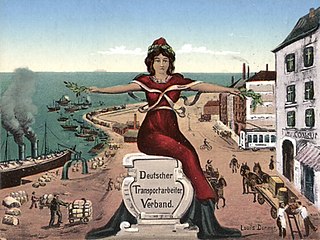Related Research Articles
The General Commission of German Trade Unions was an umbrella body for German trade unions during the German Empire, from the end of the Anti-Socialist Laws in 1890 up to 1919. In 1919, a successor organisation was named the Allgemeiner Deutscher Gewerkschaftsbund, and then in 1949, the current Deutscher Gewerkschaftsbund was formed.

The German Metal Workers' Union was a German industrial union for metalworkers formed in 1891 and dissolved after the Nazis' accession to power in 1933.
Hermann Jochade was a German trade union leader who was murdered by the Nazis.

The German Transport Workers' Union was a trade union representing transport workers in Germany.

The German Agricultural Workers' Union was a trade union representing agricultural and forestry workers in Germany.
The Union of Gardeners and Nursery Workers was a trade union representing gardeners, horticultural workers, and flower arrangers in Germany.

The Union of Municipal and State Workers was a trade union representing public sector workers in Germany.
Central Union of Roofers was a trade union representing roofers in Germany.
The Union of Hairdressers and Assistants was a trade union representing workers in the hairdressing industry in Germany.

The General Union of Public Sector and Transport Workers was a trade union representing workers in various industries in Germany.
The Central Union of Butchers and Kindred Trades of Germany was a trade union representing butchers and abattoir workers in Germany.

The Central Union of Employees was a trade union representing white collar, private sector workers in Germany.
Friedrich Etzkorn was a German trade union leader.
The Central Union of Potters was a trade union representing pottery workers in Germany.
The Central Union of Sailors of Germany was a trade union representing sailors and related workers in the German merchant navy.
The Union of German Professional Firefighters was a trade union representing firefighters in Germany.
The Union of Office Employees of Germany was a trade union representing office workers in Germany.
Max Josephson was a German trade union leader.
The Union of Bakers and Related Workers of Germany was a trade union representing workers in the baking industry in Germany.
References
- ↑ "Schwarz, Johann (1852-1928)". Friedrich Ebert Stiftung. Retrieved 24 June 2020.CS1 maint: discouraged parameter (link)
- 1 2 3 "Döring, Johann (1864-1951)". Friedrich Ebert Stiftung. Retrieved 24 June 2020.CS1 maint: discouraged parameter (link)
- ↑ "Kellermann, Georg (1853 - 1925)". Friedrich Ebert Stiftung. Retrieved 24 June 2020.CS1 maint: discouraged parameter (link)
- ↑ Brunner, Louis (1905). Die Deutschen Gewertschaften 1891-1904 (PDF). Berlin: General Commission of German Trade Unions. p. 9. Retrieved 16 June 2020.CS1 maint: discouraged parameter (link)